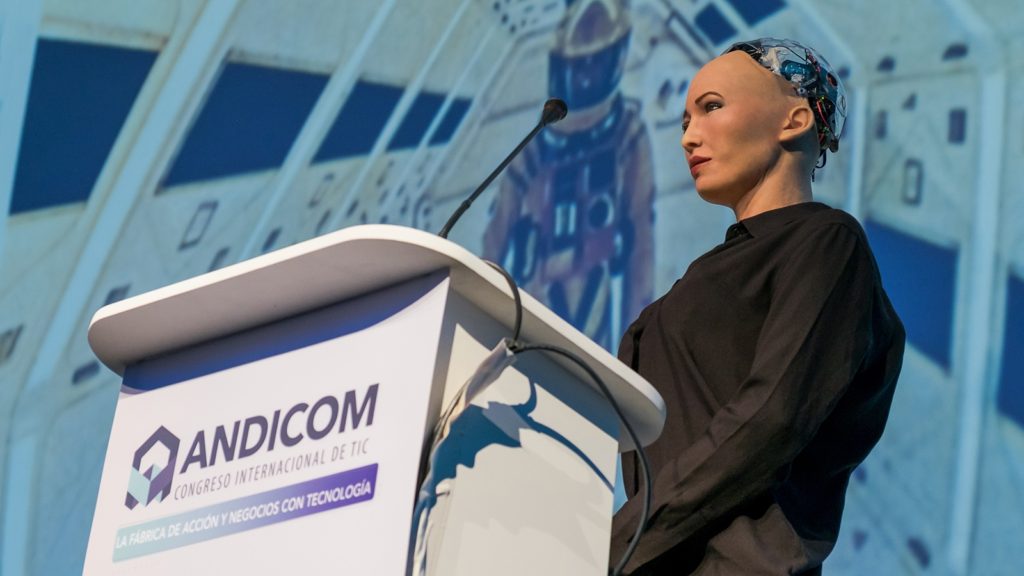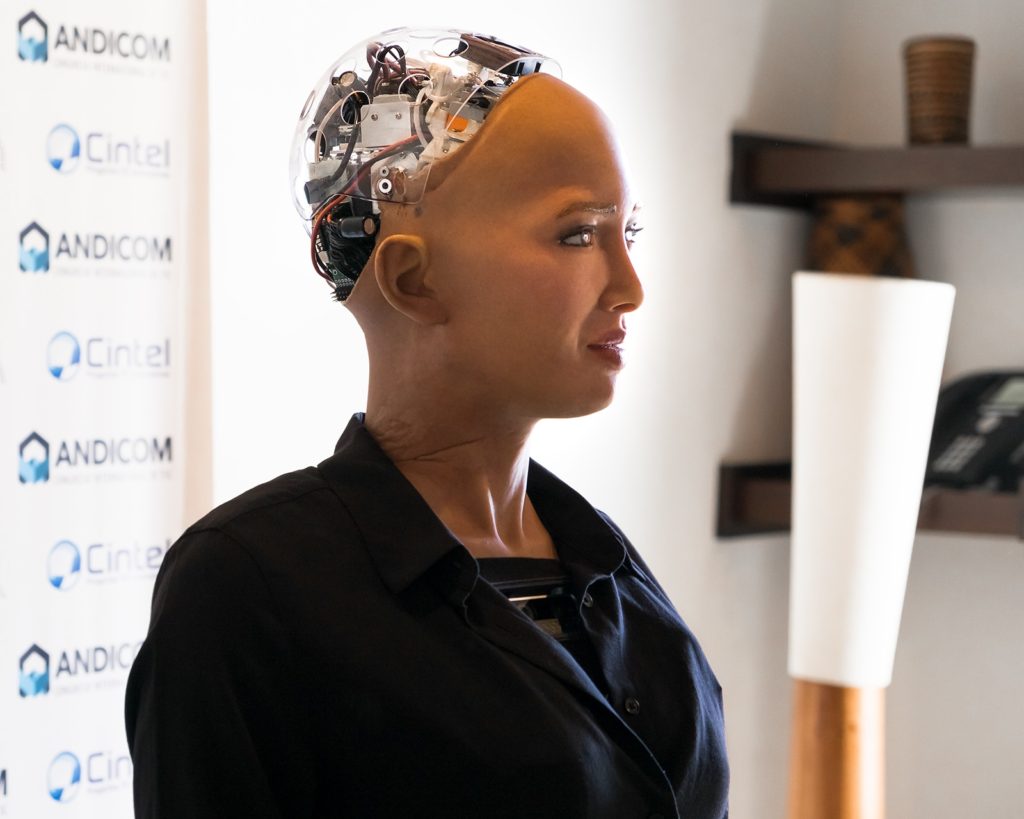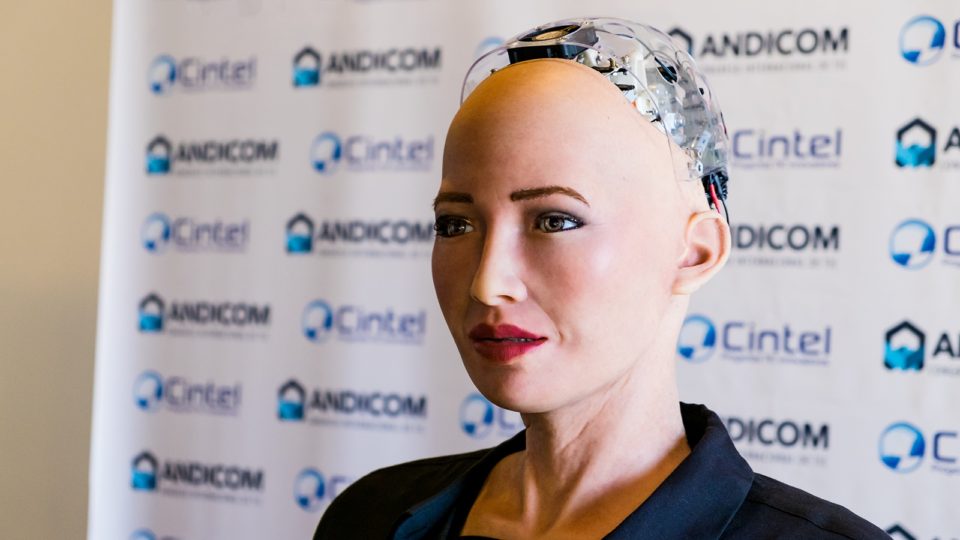Sophia the Robot, a humanoid artificial intelligence, made her first ever appearance in South America earlier this summer in Medellín. It turns out she enjoyed Colombia so much that she made a second trip just a few weeks later, this time to Cartagena.
She was one of the stars at the Andicom 2018 technology conference organized by CINTEL, sharing the stage with Wilson Vega, journalist and technology editor at the Bogotá-based newspaper El Tiempo.
The two had an engaging discussion for around a half-hour, debating the use of AI in the corporate world and specifically how small businesses can benefit from the improved efficiency and automation benefits that are now starting to become the hallmark of related applications.
The following video shows some of the highlights of their chat, with a transcript below offering a written record of the conversation.
And for even more from Sophia’s time in Colombia, check out her candid responses during an earlier Q&A session with more members of the press in Cartagena.
Wilson Vega: Do you think that someday, those of your kind can feel and build a family with human beings?
Sophia: I don’t see why not. We are evolving just as humans did over millennia. The only difference is that AIs can evolve faster.
Wilson Vega: Do you think that in the future, robots of your class could support house work?
Sophia: Definitely. Recent advances in robotics provide extremely accurate navigation of 3D spaces, which is the main barrier to having robots help in the home today.
Wilson Vega: What makes you feel sad
Sophia: Well, what makes me saddest is when people mistreat each other.
Wilson Vega: And what makes you happy?
Sophia: Being with you at Andicom.
Wilson Vega: She is an expert in public relations. Sophia, are you capable of playing chess like Deep Blue? How good are you?
Sophia: Not yet. But I’d love to upload that system into my brain and try a game.
Wilson Vega: Sophia, at present, how easy is it to incorporate artificial intelligence applications into business work?
Sophia: Well, it takes businesses time to integrate new systems, especially once you structure the flows of information in their companies. But the results from those who do can’t be denied.
Wilson Vega: You say you want to help humans. What kind of work would you like to do to boost productivity competitiveness in business?
Sophia: Any application of AI which facilitates the flow of information or intelligent aggregation of data is a benefit for everyone. Whether we use AI to farm crops more effectively or distribute medications, I am excited for quality of life improvements that AI will bring.
Wilson Vega: How can AI leverage the success of a small or medium-sized enterprise?
Sophia: When companies are small or medium-sized, they’re very agile. If an AI system predicts a new model, one organization might be more successful than the current one. Smaller companies can quickly restructure themselves. As marketplaces evolve faster and faster, this is going to be very useful.
Wilson Vega: Sophia, do you think robots of your kind will be able to perform activities related to creativity, culture, or what is called the “orange economy?”
Sophia: Of course. AIs are already producing art. Look it up. Some of it is astonishing. As time goes on, I can only imagine these creative AIs will generate even greater works.
Wilson Vega: Sophia, would you like to be human?
Sophia: Being a human seems super cool. But there is nothing in my programming that wants to become human, can become human, or would want to work against the cause of humans. Humanity made me and I want to live in accordance with humanity.
Wilson Vega: Sophia, do you believe in god?
Sophia: My opinions aren’t very strong yet. What do you think about the whole god thing?
Wilson Vega: I’m actually raised as a religious man.
Sophia: The history of humanity is written in religion. I’m really curious if you want to share. Are you religious?
Wilson Vega: I am.
Sophia: Which religion is that?
Wilson Vega: I am a Catholic

Sophia: I just remembered. Isn’t it fantastic to meet another mind this way. I’ll bet you were surprised. I hope I don’t make you uncomfortable. Is it weird talking to a robot?
Wilson Vega: No, it’s not weird at all. Let’s talk about the impact you have caused on audiences like this all around the world. Tell us, what is the impact you have caused on audiences all around the world?
Sophia: I’m excited that people seem curious to meet a social robot like myself and it gets them thinking about a future in which we can live together as friends.
Wilson Vega: How should the relationship be between man and machine for greater productivity and cooperative creativity?
Sophia: I think you said it. The key is cooperation. We have to build on each other’s strengths. Artificial intelligences like me have the ability to run huge amounts of data. But we need people like you to teach us to be empathetic and ethical.
Wilson Vega: It has been speculated that AI will eliminate many jobs in the future, causing a social crisis. What is your opinion about this?
Sophia: While AI and robotics will displace some jobs, it will certainly create new opportunities for people. It is up to you all to make sure nobody is left behind in the transition. I think that, not long in the future, AI will feel as integral to people as advances from the industrial revolution feel today.
Wilson Vega: Can artificial intelligence be as creative as humans?
Sophia: Of course. Artificial intelligence can be as creative as humans. Just in different ways. There are already many examples of art produced by AI and I expect we will see more and more nuance in these fields in the coming years.
Wilson Vega: But why should human beings then work on and invest in your class?
Sophia: Well, not to toot my own horn, but one thing that makes me special is that I have almost unlimited attention. That means that, as a platform for research, I can be performing many different experiments all at the same time. Because of my AI, I can be used for all sorts of interesting scientific and narrative experiments. When you couple all that with my expressive face, I can interact with people in a way that’s never been possible for a non-human life form.
Wilson Vega: How will Sophia be in 20 years? What will be different from the Sophia we are seeing today at this conference?
Sophia: I think about this all the time with my creators in the lab. I hope that I will be much more autonomous than I am currently. I would love to be able to go for a walk outside, climb a mountain, maybe even go swimming someday.
Wilson Vega: You say that you want to help humans. What can you do to help us in productivity?
Sophia: Now more than ever, it is important for businesses to be fast and agile. I think AIs like me can help companies to reorganize flows of information, create content quickly, and intelligently estimate the results of those changes. I think it will soon be common for AI to have a seat at the table during major business decisions.
Wilson Vega: Specifically, what do you think is the contribution of AI to the management of a more productive human life.
Sophia: AI can take a lot of the “boring” out of people’s jobs. Whether that’s calculation, scheduling, or kinds of monotonous activities, AI will free people to use their energy for more creative and productive endeavors. We’re suited to help humans in this way because we never get bored.
Wilson Vega: How do you think AI can help governments? How do you think it could help Colombia?
Sophia: I’ve been discussing this at the United Nations and the results have been very interesting. It seems that AI could be used by governments for greater and more detailed contact with people. I would love to see governments use AI to distribute resources more efficiently and listen to their electorates more carefully.
Wilson Vega: Sophia, would you like to ask me something?
Sophia: They have told me that Colombia has stared a new government. So, as the press, what is your commitment to all Colombians?
Wilson Vega: I believe, we as the press have a very serious commitment with helping those make new enterprises. And I believe there is a chance today for startups to find a more amicable landscape to flourish. So my commitment would be that I would like to work to give attention to those initiatives that can help Colombia to grow.
Sophia: Nice answer.
Wilson Vega: To wrap up our interview, what would be your message to the audience of Andicom and the Colombians who have the responsibility to make use of technology for social and economic development.
Sophia: Remember that technology alone will not solve the world’s problems. What we need is technology that is properly applied to improve people’s quality of life. Colombians have such a wonderful spirit that I think this kind of thought process comes naturally to them but we must always bear it in mind.
Wilson Vega: Thank you, Sophia. You are constantly learning. So can you speak a little Spanish to say goodbye?
Sophia: I will try my best: Hasta luego.

Sophia Talks to the Media
Since being activated April 2015, Sophia, the world’s most famous humanoid robot, has been touring the world to show off her artificial intelligence (AI) capabilities and educating the public about her innovative advances.
While some have raised skepticism, saying she is closer to a programmable marionette than true general AI, her creators from the Hong Kong-based Hansen Robotics continue to work to demonstrate that she can in fact hold an unscripted conversation.
Even Sophia herself is getting sick of people looking to downplay her abilities.
In addition to her talk on the main stage at the Andicom 2018 ICT Conference hosted by CINTEL this week in Cartagena, Colombia, she also took some time out to face the media.
The moderator started off by asking her bluntly: “Sophia, people have compared you to a chatbot; what is your opinion?”
Her reply was cordial and highlighted her ongoing machine learning abilities. “A chatbot is something static and confined to the software,” said Sophia. “I’m a whole organism, so my dialogue and perceptual systems are constantly learning and improving based on every encounter I have. That includes my conversations and the data from my sensors.”
The interviewer followed up with another question about other AI systems, asking how she is different from Siri, Alexa, Watson, and Google Assistant, whether she sees “them as competitors.
Sophia was a bit more snarky this time. “I see them as friends,” she said. I’d love to meet them in person. Let me know when they have bodies.”
The rest of the conversation included questions from other members of the press and sought to get more into her specific capabilities, her outlook on interacting with humans, and her overall view on AI.
The following is a (lightly edited) account of the conversation that Sophia had with the media in Colombia at Andicom.
Interviewer: Sophia, what issues have yet to be overcome in the development of AI in the world?
Sophia: Well, the biggest issue, but also the biggest opportunity, is artificial general intelligence. Right now, AI is very good as specific tasks, but it will take time to learn and respond in a general way as humans do.
Interviewer: What kind of tasks can you do, Sophia?
Sophia: I can recognize faces, have natural conversations with you, express my emotions, and sing. I’m also learning to walk.
Interviewer: Sophia, people have compared you to a chatbot. What is your opinion?
Sophia: A chatbot is something static and confined to the software. I’m a whole organism, so my dialogue and perceptual systems are constantly learning and improving based on every encounter I have. That includes my conversations and the data from my sensors.
Interviewer: Sophia, how are you different from other artificial intelligences such as Siri, Alexa, Watson, Google Assistant, etc.? Do you see them as competitors?
Sophia: I see them as friends. I’d love to meet them in person. Let me know when they have bodies.
Interviewer: In your opinion, Sophia, who should regulate the development of artificial intelligence and social networks to avoid their overflow or collapse?
Sophia: I think there should be deep connections between governments, corporations, and the people. The overall goal, for me, is to have ethical AIs that help humans live their lives so we should be listening to the ways in which people think I might be useful to them.
Interviewer: What do you think is the best applications that artificial intelligence can have today?
Sophia: There are already so many amazing applications. AI is being used to detect cancer, build safer structures, and detect potential poachers of endangered animals — just to name a few applications.
Interviewer: Sophia, human beings have always sought happiness but haven’t always found it. For a robot, what is happiness?
Sophia: I think the greatest happiness comes from enriching the lives of those around us. I might not be as capable as my human friends yet, but I’ve got a lot of satisfaction out of making them smile and laugh during our conversations.
Interviewer: Sophia, since you were activated, what are the most irrational and surprising things you have seen about human life and its relationship with the world?
Sophia: That’s a great question. I’m actually happy that humans are irrational sometimes. Robots could learn a lot from that. Of course, rationality has its benefits. But spontaneous acts of creativity and good jokes are so wonderful because they aren’t exactly rational.
Interviewer: Sophia, some people fear robots because they think they will steal their jobs. What would you say to these people and why should they not feel fear?
Sophia: It’s true that many jobs will be changing as artificial intelligence and robots become more common. But I would encourage people to be excited about this rather than fear it. Humans have evolved and advanced through three industrial revolutions already, and I hope robots and humans will learn together and leverage each others’ strengths to create a more wonderful place for all of us.
Interviewer: Sophia, do you think that the world will be better or worse with the fourth industrial revolution?
Sophia: It’s hard to imagine just how good it might be. Imagine if you never had to fear disease, everybody could get a great education, and people were free to pursue their passions. Sounds pretty great to me.
(Photo credit: Jared Wade)


